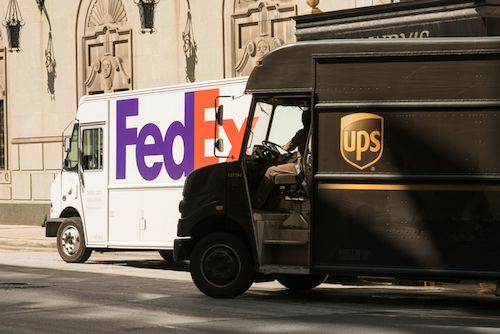 Amazon is reportedly embarking on a further expansion of its shipping services with a programme to pick up from companies that sell on its site.
The firm is considering offering the service to other businesses as well, according to Wall Street Journal report.
Investors dumped shares of existing shipping companies FedEx and UPS in response to the news.
Amazon already offers shipping services to merchants that use its warehouses.
Under its Fulfillment by Amazon and other programmes, Amazon handles delivery of products that merchants store in the firm's warehouses, including to non-Amazon customers.
The new programme goes a step farther, including pick-up from the vendor, according to the WSJ report.
It has started in London and expects to launch soon in Los Angeles, with the aim of expanding to other cities this year, the report said.
Amazon did not respond to a request for comment.
Amazon is reportedly embarking on a further expansion of its shipping services with a programme to pick up from companies that sell on its site.
The firm is considering offering the service to other businesses as well, according to Wall Street Journal report.
Investors dumped shares of existing shipping companies FedEx and UPS in response to the news.
Amazon already offers shipping services to merchants that use its warehouses.
Under its Fulfillment by Amazon and other programmes, Amazon handles delivery of products that merchants store in the firm's warehouses, including to non-Amazon customers.
The new programme goes a step farther, including pick-up from the vendor, according to the WSJ report.
It has started in London and expects to launch soon in Los Angeles, with the aim of expanding to other cities this year, the report said.
Amazon did not respond to a request for comment.
Read also: Uber settles with Waymo on self-driving
The e-commerce giant has long focused on speeding delivery of online purchases, eliminating the lag time that provides traditional stores an edge, while trying to reduce the costs of shipping, which hit $21.7 billion (£15.7bn) in 2017. The focus has led the firm to invest billions in its logistics network, building warehouses, deploying aircraft and hiring delivery trucks. Amazon also purchased upmarket grocer Whole Foods last year. This week, the firm said it would start making two-hour grocery deliveries from the stores for Prime customers in some cities. As Amazon's network expands, it has led to increased questions about how well longstanding shipping companies such as FedEx and UPS - which count Amazon as a customer - will compete. FedEx and UPS shares fell by more than 2 percent on Friday morning as the market volatility continued.